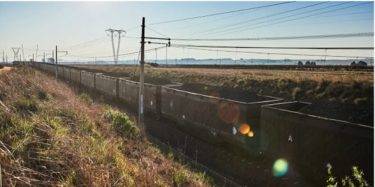Transnet is planning to open up third-party access to the rail network from April this year, delegates at the Investing in African Mining Indaba 2024 heard this week.
Andrew Shaw, chief strategy and planning officer at Transnet, says third-party access will open up following public consultation.
“There is considerable opportunity for enhancing rail’s ability to move minerals and manufactured products. The idea is for third-party access to the network so that additional operators can operate and compete with the state-owned operator and provide services to a multitude of customers,” he said.
In October last year, Transnet Freight Rail cancelled a conditional contract with Traxtion Sheltam, which had emerged as a successful bidder in November 2022 to operate the Kroonstad to East London railway line.
When it comes to volumes moved, Minerals Council SA chief economist Hugo Pienaar says coal export data for 2023 suggests about a third of coal exported was transported to ports via trucks rather than rail.
According to the South African Association of Freight Forwarders, South Africa’s freight demand is high, at nearly 500 billion tonne-kilometres.
“We need a multi-modal approach to satisfy our freight demand. At the worst of times recently, the inefficiencies in rail cost us R1-billion a day, while the inefficiencies at the ports amount to a loss of R200-million a day.
“These numbers are staggering – clearly highlighting the magnitude of the current problems and the desperate need to overturn them,” observed Dr Juanita Maree, chief executive of the SA Association of Freight Forwarders.
Public-private partnerships
Jonathan Veeran, partner and a mining expert from Webber Wentzel, says initiatives to improve freight logistics are welcome, but the tangible impact on current operational challenges, particularly on export, requires clearer articulation and demonstrably faster results.
“Public-private partnerships (PPPs) offer an effective way to expedite infrastructure development. The government should create an environment conducive to PPPs, fostering deeper collaboration with private investors and leveraging their expertise and capital, rather than preventing the realisation of benefits of PPPs, from being stalled (or aborted) because of excessive red tape and unnecessary regulatory hurdles,” Veeran says.
The mutual cooperation agreement between Transnet and Richards Bay Coal Terminal (RBCT) seems to be an example of a functional relationship.
The recent delivery of seven full sets of batteries procured by RBCT is expected to improve the reliability of Transnet Freight Rail’s available locomotive fleet.
Procurement of locomotive spares – batteries and compressors – is one of the joint initiatives Transnet and RBCT embarked on following the conclusion of the agreement. In this regard, orders were placed for 50 compressors and 1,800 batteries (100 full sets of batteries).
The 100 full sets of batteries are scheduled to be delivered by the end of April 2024. Transnet is forecasting to rail 49mt of export coal to RBCT against a declared capacity of 60mt for the financial year ending March 2024.
Freight Logistics Roadmap
The Freight Logistics Roadmap that the industry is pinning its hopes on proposes three areas of intervention:
Operations and rolling stock improvements: This includes returning long-standing locomotives to service through agreements with original equipment manufacturers to ensure a supply of spares.
Security and safety of the rail network: collaboration with law enforcement agencies to ensure the safety of the network.
A capital investment programme for expansion plans and to sustain operations.



